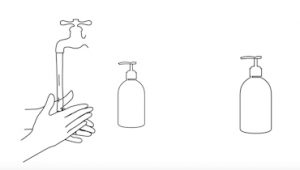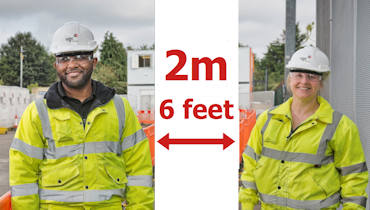The Construction Leadership Council has updated the site operating procedures to protect everyone.
They want to keep construction sites operational wherever it is practical and safe.
You can download the full site operating procedures from the Construction Leadership Council’s website.
Below is a summary of the procedures. There may be extra rules on your worksite.
Health and safety are still priorities.
As always, if you can’t do an activity safely, perhaps because there aren’t enough qualified people, or because of social distancing, stop work. Report the issue to your supervisor, labour manager, or besafe@vgcgroup.co.uk
The UK’s emergency services are under pressure: don’t give them more work!
Self-isolation
- Do not come to site if you have a high temperature or a new persistent cough, or if you are a vulnerable person, or living with someone who is.
- If you become ill at work you must tell your manager, and then go home immediately, without touching anything, or getting close to anyone. Get a coronavirus test and stay in isolation at home until you get the result. When you get the results, the NHS will tell you what to do next. (See our web page for how to report your absence.)
Travel
- Travel to site alone; try to avoid public transport.
- If you have to share a vehicle, you should stay apart as much as possible, and share with the same people each time. (See our travelling safely page and video for more details.)
- Wash your hands with soap and water as soon as you arrive at site.

Site access
- You should aim to keep 2m away from colleagues at all times. This may mean waiting for longer than usual to enter site, or to use the welfare facilities.
- If you need to be closer than 2m to colleagues, try not to face each other. Work side-by-side to lower the risk of infection.
- Drivers must remain in their vehicles if possible. Wash your hands before unloading goods and materials.
Food and drink
- Bring your own food and refillable drinking bottle to work. Work canteens may provide takeaway food, or they may be closed. You should not leave site to go to the local shops.
- Wash your hands thoroughly before eating and drinking.
- Sit at least two metres apart on all breaks.
- Make sure you put all rubbish into the bins.
Avoid close working
- While it may not always be possible or safe to work a full two metres apart, you must not carry out physical work that requires close contact unless it is essential. If you have to be near someone else, that should be for as short a time as you can manage.
- Workers will be kept in small teams, and work with the same team as much as possible.
- You may not do any work that requires you to touch another person’s skin.
- Use the stairs rather than lifts or hoists, so you can keep two metres apart. If you have to use a lift or hoist, they must carry as few people as possible, and all the doors, buttons etc must be regularly cleaned.
- Do not share reusable PPE. It must be thoroughly cleaned after use.
- Make sure you dispose of single use PPE properly.
Meetings
- Hold site meetings in open areas where possible, keeping everyone two metres apart.
Cleaning
- There will be enhanced cleaning across the whole site, especially communal areas and places people touch. These include taps, handles, toilet seats and flush, hand rails, machinery controls, telephones and office equipment.
- Rubbish bins must be emptied regularly.
If a site can’t implement these measures consistently, it may be shut down.
Balfour Beatty has created this video which summarises the CLC site operating procedures:
The Rt Hon Alok Sharma MP, Secretary of State for Business, Energy and Industrial Strategy, said:
For many people working in construction their job requires them to travel to their place of work, and they can continue to do so.
Thank you again to everyone operating in the UK construction sector. You are making a hugely valued and critical contribution. I salute you for your efforts to support the UK economy.
